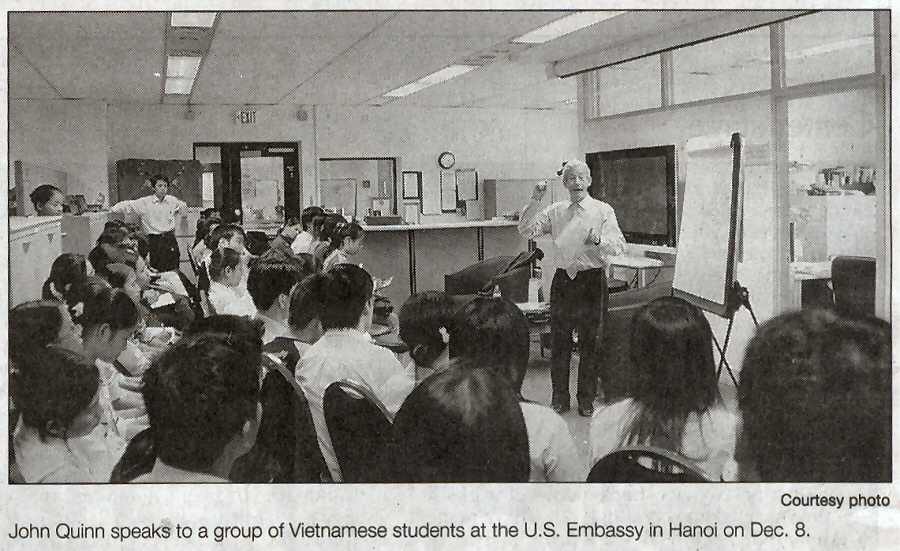RCHS Class of 1961
RCHS Class of 1961
RCHS Class of 1961
RCHS Class of 1961
RCHS Class of 1961
RCHS Class of 1961
Vietnam new economic tiger in Asia
By John Quinn, Special to the Journal
Editor’s note: Economist John Quinn, senior professor and director of external relations for National American University in Rapid City, recently returned from a teaching assignment in Vietnam. He was there on behalf of NAU’s cooperative arrangement with the National Economics University of Vietnam. He taught at both its campuses in Hanoi and Ho Chi Minh City. Quinn also visited the fledgling and fast-growing Vietnamese Stock Exchange. He filed this report.

John Quinn poses on the famous Roof Garden Bar at the old Rex Hotel in Ho Chi Minh City. A favorite hangout for war correspondents during the Vietnam War, the roof garden is now dwarfed by new high-rise hotels, visible in the background. (Courtesy photo)
HANOI — Vietnam is booming.
This Southeast Asian nation of 84 million people is experiencing a gross domestic product growth rate of 8 percent, among the highest in the region. Foreign direct investments for 2006 have reached more than $8.3 billion, a 37 percent increase from 2005.
A November announcement by Intel that the world’s largest chipmaker will invest $1 billion in the country is a dramatic addition to numerous other projects by giant multinationals, as well as smaller entities. The American Chamber of Commerce in Ho Chi Minh City has 325 firms as members. And more American firms are arriving.
The statistics are impressive: exports of footwear products are up 19.3 percent year-over-year, wood products by 38 percent, and seafood exports by 25 percent. Coffee, rice and apparel show strong gains, and tourist resorts multiply as direct flights increase from every region, including discount flights from Australia recently announced. The U.S. Trade and Development Agency has named Vietnam the 2006 Country of the Year.
Vietnam has become the newest Asian “Tiger” economy, following by more than three decades the original “tigers” of Hong Kong, Singapore, Korea and Taiwan and — by about 25 years — the additions of Thailand and Malaysia to that group.
Expectations are high as Vietnam becomes the newest member of the World Trade Organization.
Its young, fast-growing stock exchange now boasts more than 60 listings, with many companies rushing to list before government tax incentives expired on Jan. 1. With a 110 percent gain over the past 12 months, the Vietnam stock index is the best-performer in Asia.
Anecdotal evidence of change is everywhere. Upon landing at Hanoi’s super-modern international airport, there were greeting signs from the recently-concluded Asia-Pacific Economic Cooperation summit which President Bush attended in November, along with leaders from around the Pacific Basin.
Large signs for Hong Kong and Shanghai Banking, Federal Express and dozens of other foreign multinationals from every continent line the road from the airport. The drive to the city passes sprawling warehouses with the names of many others, including Canon, Siemens and the LG Group. Once inside Hanoi, Nokia seems ubiquitous.
In Ho Chi Minh City, a sprawling metropolis of 9 million people, prosperity is readily apparent. As in Hanoi, the roar of motorcycles is everywhere, with luxury cars wending their way through the swarms.
Five-star hotels abound — such as New World, the Caravel and the Hilton — filled with businesspeople making deals in the new Vietnam, or tour groups from every continent.
Glittering department stores feature Valentino, Versace, Gucci, Mont Blana, Pierre Cardin and Rado — hardly names Karl Marx might have imagined for a socialist country.
Openings to the outside world are abundant in both cities. International editions of the world’s leading newspapers, and access to foreign networks, including CNN, the BBC, Deutsche Welle, and even Bloomberg, MTV and ESPN, are available everywhere.
At that grand dowager of HCMC’s hotels, the Rex, the Rooftop Garden Bar (one of the “1,000 places on earth you must visit before you die,” according to Patricia Schultz’s new book), featured a large-screen TV playing a Milwaukee Bucks/Phoenix Suns Game. The French tour group didn’t seem interested.
Vietnamese students seeking their MBAs at the National Economics University, on whose two campuses I taught, are bright, well-educated and pragmatic. They work for an impressive array of multinational firms, including Unilever, Price Waterhouse and Hitachi, or the Vietnamese government and its agencies, and for U.S. agencies such as the Agency for International Development.
Some are young bankers. Others are already entrepreneurs. One student in Ho Chi Minh City has her own cosmetics firm and appears on a daily television show similar to the United States’ “Today” show. She drove away in her new Mercedes after each class.
Another has been in the booming construction business for 10 years with his father and uncle, and he and his chauffeur gave me a ride back to the airport. Two other students have started fast-food sandwich chains.
Vietnamese are looking to the future optimistically, but with some apprehension that China’s worsening trade relations with the U.S. may taint them.
Vietnam obtained Permanent Normal Trade Relations status with the United States in mid-December. The measure passed by a wide margin in the U.S. Senate but by a much narrower margin in the House. Vietnam is expecting a more protectionist Congress in 2007. Of particular concern are its garment exports, which represented 38 percent of Vietnam’s $8.8 billion of total exports to the U.S. in 2006.
Will U.S. trade deficits with China — consistently running more than $20 billion per month — hurt an emerging Vietnam? Asia’s newest Tiger hopes not.

home page

